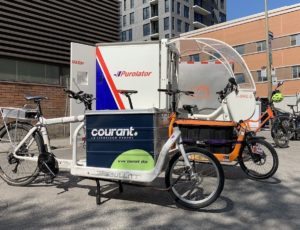Pilot project will reduce heavy truck traffic entering the downtown core by offloading deliveries to smaller electric vehicles

Cargo bikes participating in Colibri, Montreal’s eco-friendly urban delivery project. Photo: CNW Group/Ville de Montréal – Arrondissement de Ville-Marie
Pilot project will reduce heavy truck traffic by offloading deliveries to smaller electric vehicles
Parcel deliveries might look at a bit different in Montréal, as the city invests in a scheme already common in many European cities to cut down on the number of trucks entering the downtown core.
The one-year pilot project, called Colibri, officially launched on Sept. 12 after being announced in June. Designed to reduce the congestion and pollution impacts of “last mile“ deliveries, it will see large transport vehicles unload packages at a former bus station between Berri and St-Hubert streets. From there, electric cargo bikes and other zero-emission vehicles will drop off the packages throughout the city.
Greener and safer
“I’m excited about this innovative new project supported by partners interested in testing tomorrow’s more environmentally friendly delivery solutions,“ says Valérie Plante, mayor of Montréal and the Arrondissement de Ville-Marie. “The Colibri project will not only support our city’s shift to a greener future, but also help improve the safety of road users by limiting the number of trucks in the city centre.“
The city has budgeted $100,000 for the pilot. Joining it is Purolator, as well as bike couriers Chasseurs Courrier, Courant Plus, La roue libre and LVM Livraison. The city hopes their initiative will inspire others to take charge as retail habits change and grow.
“The development of green technologies and the growth of online retail are spawning new delivery solutions,“ says Robert Beaudry, district councillor for Saint-Jacques and head of economic and commercial development on the city’s executive committee.

Montréal isn’t the only Canadian community to try this kind of project. Peel Region in Ontario ran an off-peak delivery service pilot from for six months in 2018, followed by a second phase this year that ended in August. (That concept doesn’t necessarily replace trucks but keeps them off the road when other traffic is heaviest.)
$183-million LC3 initiative
Programs to offset urban trucking emissions were also cited in the menu of potential transportation solutions that accompanied the launch of the federal government’s $183-million Low Carbon Cities Canada (LC3) initiative in March. To date, none of the seven urban areas receiving funding under the program — greater Vancouver, Edmonton, Calgary, Greater Toronto and Hamilton Area, Ottawa, metropolitan Montréal and the Halifax region — have revealed specific plans.
In time, the private sector is also expected to step in this area. In Quebec, for example, IGA grocery stores introduced a zero-emission home-delivery vehicle in 2018. And in Vancouver, a cooperative called Shift Delivery has been marketing its fleet of cargo tricycles as a zero-emission last-mile delivery service since 2012.






